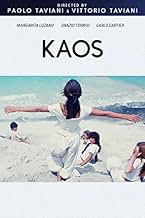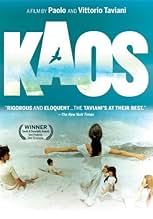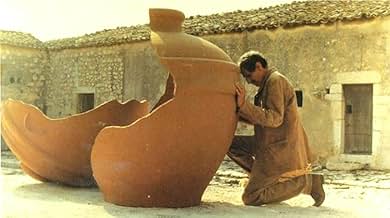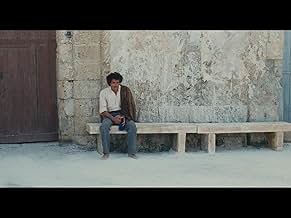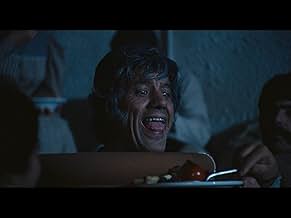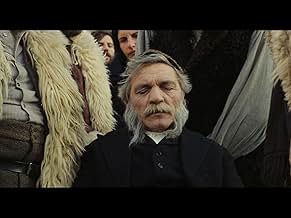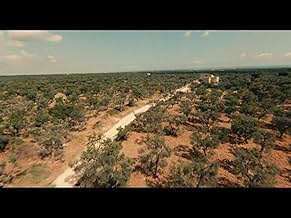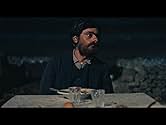NOTE IMDb
7,8/10
3,3 k
MA NOTE
L'autre Fils, Requiem, Mal de Lune et Entretien avec la mère, tels sont les titre des 4 contes mis en images par les frères Taviani. Ils nous transportent dans un univers envoutant ou la tra... Tout lireL'autre Fils, Requiem, Mal de Lune et Entretien avec la mère, tels sont les titre des 4 contes mis en images par les frères Taviani. Ils nous transportent dans un univers envoutant ou la tragédie, le fantastique et le rêve se confondent.L'autre Fils, Requiem, Mal de Lune et Entretien avec la mère, tels sont les titre des 4 contes mis en images par les frères Taviani. Ils nous transportent dans un univers envoutant ou la tragédie, le fantastique et le rêve se confondent.
- Réalisation
- Scénario
- Casting principal
- Récompenses
- 4 victoires et 8 nominations au total
Regina Bianchi
- Madre di Pirandello (segment "Colloquio con la madre")
- (as Régina Bianchi)
Avis à la une
Which, unfortunately is impossible for three hours. I've seen it two times in the cinema. The characters are so good, and are given all the time and space to develop starting with MariaGrazia. I really can't think of a movie that's made with more love and dedication. La Giara is a rare but welcome break and watch how Franchi and Ingrassia interact, watch the beauty of baby Bata's eyes in Mal di Luna. Just find out all those details and you won't be disappointed. Having seen Italy after watching KAOS was a feast of recognition, it's really like that, the villages where time stands still, the people, go and see it and you won't be disappointed.
The Taviani Brothers evoke the mystery, drama, and stark beauty of Sicily in this wondrous three-hour film, with its four earthy stories and sublime epilogue. In "The Other Son" a demented Sicilian mother (Margarita Lozano) longs to hear from her sons who have emigrated to American and forgotten her,. Memories of a traumatic rape experience as a young woman prevent her from being able to accept the love of her only devoted son who follows her around with his cows. "Moon Sickness" tells about a young bride who discovers that her husband likes to howl at the full moon. She is not without an erotic moonsickness of her own which makes her crave sex wit her cousin when the husband is unable to perform his marital duties. "The Jar" features comedians Franco Franchi and Ciccio Ingrassia in a classic comic narrative about a mean landowner's large broken olive jar and the jar-mender who gets trapped inside and their ensuing battle of wits. "Requiem" deals with rural shepherds who want to have a graveyard to bury thir dead. In the epilogue "Conversation with Mother", we see playwright/storyteller Luigi Pirandello returning to his native Sicilian town after years of success on the mainland. He encounters the spirit of his mother who recounts a fabulous fairy-tale journey taken when she had been a child. It is a stunning twenty-minute sequence that must surely rank with the best moments in the history of Italian cinema. The images of the children rolling down the mountain of pumice on the "Pumice Island" are of a poetic lyric intensity. The shot of Pirandello sitting silently in the chair that no longer contains the mother he had been speaking to is also utterly moving. Nicola Piovani's passionate and transporting musical score (he would later do the music for LIFE IS BEAUTIFUL)adds immeasurably to the the experience of this powerful work of art.
Four Pirandello stories and an original epilogue form a portrait of Sicily, linked by the flight of a raven - bird of ill omen - over the landscape with a tinkling bell around its neck. The film-making is perfect in its calm effortlessness and quiet simplicity, always finding the essence of a situation. Often, the camera makes small, revealing horizontal pans, then pans back and reveals again, as the first subject has changed.
Every episode is infused with a sympathy for whatever simple inescapable sorrow everyone is afflicted with - peasants, grandees, men in uniform - which often seems to seep into them from the land. Even the happiest character in the film - a lawyer - is in bed recovering from an operation. Each story has layers of meaning and a melancholy twist - even the comedic episode finishes on a note of tragedy.
The first story opens as the country is being drained of its men - they're off the America - leaving the parched landscape to the sullen women. An interesting moral dilemma is raised: how if a woman is raped by her husband's murderer and has a child which grows up to look exactly like its father? The bitter irreconcilability stands for the rift between the old land and the new.
In the second story, possibly the finest, a newly married woman discovers that her husband goes berserk, wolf-man like, every full moon. She uses the occasion as an excuse to bring her former lover to her room while her husband rages outside. There's a step forward in the moral arc of the film - reconciliation is possible when you come to understand someone else's suffering.
The Jar is remarkable, not so much for the diabolic overtones of the hunchback who gets trapped inside the giant olive jar he has just mended, as for the surprising bitterness of the landlord whose success is made mockery of by thoughts of death.
Death itself is the subject of the fourth story in which an old man sits over his grave and literally waits for it to come in order to lay claim to the land he will be buried in. Since the land, on which generations become established, becomes in effect composed of the dead, there is a subtle moral question of a man's rights here, suffused with ghostly mysticism - an issue we have lost sight of in the modern world.
The Epilogue is almost too sublime to describe. It may be the most perfect, most meaningful 20 minutes ever put on film. In it, Pirandello himself, weary now of life, travels to his childhood home in Sicily, drawn by the spirit of his mother. She tells him again the story of the journey into exile by boat when she was a girl, only this time filling in some crucial forgotten detail. The span of time held in our mind here is breathtaking - backwards from an old woman long dead who is reflecting on the memory of an intense childhood experience; forwards to her son, now old himself and aware of his own impending death, trying to capture some meaning in it all that is the spark of life, knowing that this spark itself will soon go out. The climax to his mother's story - cascading down a white cliff of powdery white pumice into an azure sea is an image so beautiful, so mixed of elation and despair, that no more words in the film are possible, nor necessary.
Every episode is infused with a sympathy for whatever simple inescapable sorrow everyone is afflicted with - peasants, grandees, men in uniform - which often seems to seep into them from the land. Even the happiest character in the film - a lawyer - is in bed recovering from an operation. Each story has layers of meaning and a melancholy twist - even the comedic episode finishes on a note of tragedy.
The first story opens as the country is being drained of its men - they're off the America - leaving the parched landscape to the sullen women. An interesting moral dilemma is raised: how if a woman is raped by her husband's murderer and has a child which grows up to look exactly like its father? The bitter irreconcilability stands for the rift between the old land and the new.
In the second story, possibly the finest, a newly married woman discovers that her husband goes berserk, wolf-man like, every full moon. She uses the occasion as an excuse to bring her former lover to her room while her husband rages outside. There's a step forward in the moral arc of the film - reconciliation is possible when you come to understand someone else's suffering.
The Jar is remarkable, not so much for the diabolic overtones of the hunchback who gets trapped inside the giant olive jar he has just mended, as for the surprising bitterness of the landlord whose success is made mockery of by thoughts of death.
Death itself is the subject of the fourth story in which an old man sits over his grave and literally waits for it to come in order to lay claim to the land he will be buried in. Since the land, on which generations become established, becomes in effect composed of the dead, there is a subtle moral question of a man's rights here, suffused with ghostly mysticism - an issue we have lost sight of in the modern world.
The Epilogue is almost too sublime to describe. It may be the most perfect, most meaningful 20 minutes ever put on film. In it, Pirandello himself, weary now of life, travels to his childhood home in Sicily, drawn by the spirit of his mother. She tells him again the story of the journey into exile by boat when she was a girl, only this time filling in some crucial forgotten detail. The span of time held in our mind here is breathtaking - backwards from an old woman long dead who is reflecting on the memory of an intense childhood experience; forwards to her son, now old himself and aware of his own impending death, trying to capture some meaning in it all that is the spark of life, knowing that this spark itself will soon go out. The climax to his mother's story - cascading down a white cliff of powdery white pumice into an azure sea is an image so beautiful, so mixed of elation and despair, that no more words in the film are possible, nor necessary.
I saw Kaos, yesterday evening with friends who didn't know it or don't remember it. At this time, Italian cinema produces masterpieces. The emotional power acts after years, specially during the "novel" ends this movie, when Pirandello : at his top, comes back into the family house, re-open it, sees again, the only women he loves and remembers his trip, his family, his feelings : the splendor of childhood, the wildness of this isle, the warm of being protected & loved by his entire family in dramatic circumstances... Well : the music was written by Mozart himself. The beginning of this part is a kind of "Sergio Leone period : once upon in time..." a western like "I"m back" without guns and an harmonica. No action, but only emotion which grows again & again My POW ? A very great movie upon Sicilia, Mens, Women, family, land... See by two directors who knows emotion in movies are more important than 3D effects... God (Ford & Griffith) bless them Sorry my American & English are poor, but I'm just a french guy. See this movie and enjoy it (don't forget a bunch of Kleenex) you will never see that again.
10wobelix
Once Sicily was the center of our western world, and this film shows us all the beauties of far, far away, together with a Pastorale worthy of a Beethoven Symphony.
No No, Nicola Piovani composed the unforgettable music all by himself.
This film is timeless, with an imagery, thanks to master Giuseppe Lanci, that is as well sober as breathtakingly beautiful.
There is not one weak actor and the stories are from Luigi Pirandello, who aimed to make one gorgeous novella for each day of the year.
KAOS of the Taviani-brothers could, or maybe even should, be watched every day of the week. This must truly be the most beautiful cinematic achievement ever.
No No, Nicola Piovani composed the unforgettable music all by himself.
This film is timeless, with an imagery, thanks to master Giuseppe Lanci, that is as well sober as breathtakingly beautiful.
There is not one weak actor and the stories are from Luigi Pirandello, who aimed to make one gorgeous novella for each day of the year.
KAOS of the Taviani-brothers could, or maybe even should, be watched every day of the week. This must truly be the most beautiful cinematic achievement ever.
Le saviez-vous
- AnecdotesThe title of the movie comes from a quote of Luigi Pirandello, the author of the book the movies is based on. Pirandello used to say to be a "son of chaos", since he was born in Càvusu, a small village, whose name came from the Greek "Kàos", "chaos".
- Versions alternativesTheatrical release in Italy did not include the segment "Requiem".
- ConnexionsEdited into Bellissimo: Immagini del cinema italiano (1985)
Meilleurs choix
Connectez-vous pour évaluer et suivre la liste de favoris afin de recevoir des recommandations personnalisées
- How long is Kaos?Alimenté par Alexa
Détails
Box-office
- Montant brut aux États-Unis et au Canada
- 325 717 $US
- Week-end de sortie aux États-Unis et au Canada
- 11 412 $US
- 17 févr. 1986
- Durée
- 3h 7min(187 min)
- Mixage
- Rapport de forme
- 1.85 : 1
Contribuer à cette page
Suggérer une modification ou ajouter du contenu manquant



